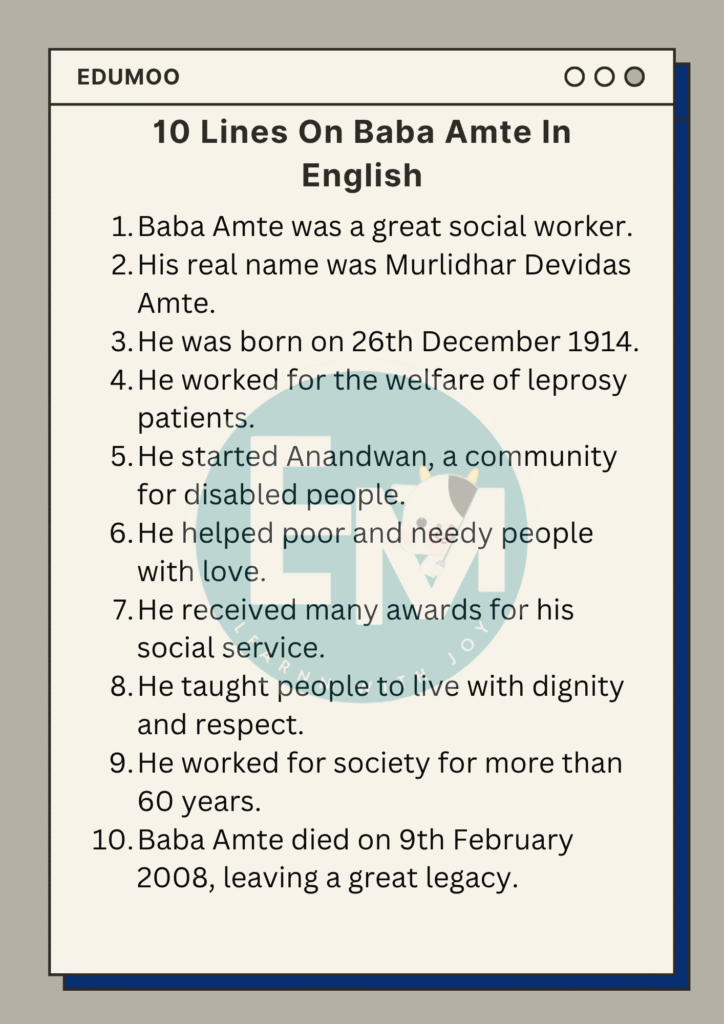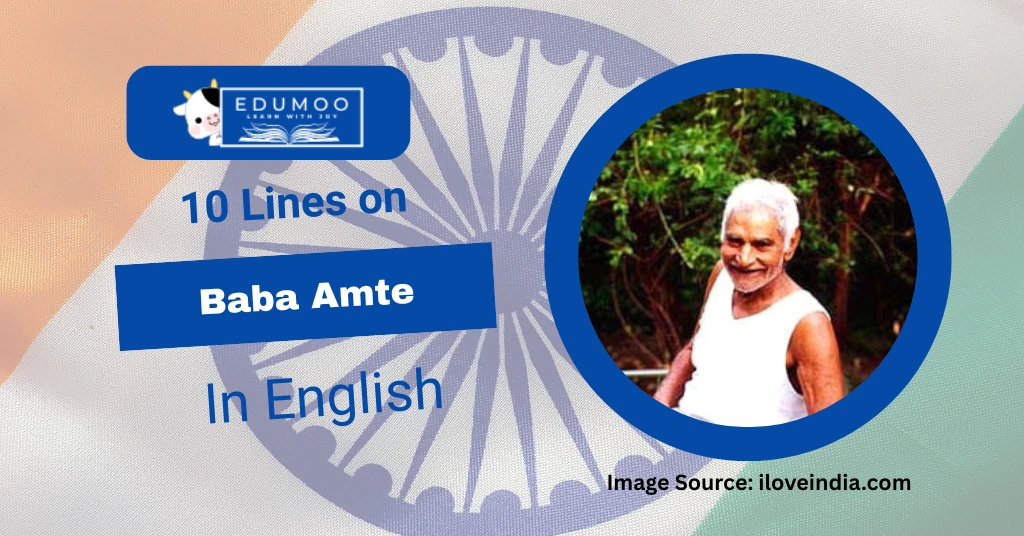Baba Amte was a great man who dedicated his life to helping others. He worked especially for people suffering from leprosy, a disease that made many feel isolated. Baba Amte believed that everyone deserves respect and love, no matter their condition. He founded Anandwan, a place where sick and disabled people could live, work, and learn happily. His selfless service inspired many people across India and the world. Learning about Baba Amte teaches us the importance of kindness, helping others, and working for the betterment of society.
10 Lines On Baba Amte In English
- Baba Amte was a great social worker.
- His real name was Murlidhar Devidas Amte.
- He was born on 26th December 1914.
- He worked for the welfare of leprosy patients.
- He started Anandwan, a community for disabled people.
- He helped poor and needy people with love.
- He received many awards for his social service.
- He taught people to live with dignity and respect.
- He worked for society for more than 60 years.
- Baba Amte died on 9th February 2008, leaving a great legacy.

Essay On Baba Amte In English In 300 Words
Baba Amte was one of India’s most respected social workers. His real name was Murlidhar Devidas Amte, and he was born on 26th December 1914 in Maharashtra. From a young age, he wanted to help people and make society better. After seeing the suffering of leprosy patients, he decided to dedicate his life to helping them. At that time, leprosy was a very feared disease, and people avoided those who were affected. But Baba Amte believed that every person deserves love, care, and respect.
He started Anandwan, which means “Forest of Joy,” a place for leprosy patients to live, work, and learn. Here, patients could earn their living, gain education, and live with dignity. Baba Amte also worked to remove social stigma and taught people to accept leprosy patients as equal members of society. He believed that helping others is the greatest service a human can do.
Baba Amte also worked for farmers, disabled people, and environmental protection. He was a true inspiration and showed that one person’s effort can change many lives. Over his life, he received many awards, including the prestigious Padma Vibhushan and Gandhi Peace Prize, for his selfless service.
Even after his death on 9th February 2008, his legacy continues. Anandwan is still helping thousands of people and spreading the message of love, kindness, and equality. Baba Amte’s life teaches us important lessons: we should help the needy, fight against injustice, and treat everyone with respect.
In today’s world, where people often forget kindness, Baba Amte’s life reminds us of the power of selfless service. Learning about him inspires children and adults to be compassionate and work for the betterment of society. He showed that true happiness comes from helping others and making the world a better place.
Essay On Baba Amte In English In 800 Words
Baba Amte was one of the greatest social workers of India. His real name was Murlidhar Devidas Amte, and he was born on 26th December 1914 in a small town in Maharashtra. From a young age, he was known for his kind heart and desire to help people. Baba Amte belonged to a wealthy family, but he did not care about wealth or comfort. Instead, he wanted to use his life to help people who were suffering. He believed that serving humanity is the most important duty of a human being.
Baba Amte is best known for his work with leprosy patients. In his time, leprosy was a very serious and feared disease. People who had leprosy were often rejected by their families and society. They were treated unfairly and forced to live in isolation. Many people were scared to even touch them. When Baba Amte saw the pain and suffering of these patients, he could not ignore it. He decided to dedicate his life to helping them and giving them hope.
To help leprosy patients, Baba Amte founded Anandwan, which means “Forest of Joy.” Anandwan is a special place where leprosy patients could live, work, and learn without fear or shame. Baba Amte wanted them to feel respected and independent. At Anandwan, patients could do different kinds of work such as farming, weaving, and making handicrafts. They could earn their living and support themselves. Baba Amte believed that leprosy patients should not be dependent on others. They should have dignity and confidence. He also started schools and hospitals in Anandwan so that patients could get proper education and medical care.
Baba Amte did not stop at helping leprosy patients. He also worked for other marginalized and disabled people. He helped poor farmers, tribal communities, and people with physical disabilities. He wanted to make society fair and equal for everyone. He believed that every person, no matter their social status or physical condition, deserved respect and opportunities. Baba Amte also spoke against social injustice and worked to protect the rights of poor and helpless people.
Baba Amte’s work was recognized nationally and internationally. He received many awards for his selfless service, including the Padma Vibhushan, one of India’s highest civilian awards, and the Gandhi Peace Prize. Despite these honors, he remained humble and continued to serve people until his last days. Baba Amte believed that true happiness comes from helping others, not from fame or money.
He also worked to remove the social stigma attached to leprosy. In his time, many people believed that leprosy was a curse or punishment. Baba Amte taught everyone that leprosy is a disease and patients should be treated with love and care, not fear. His work helped thousands of people regain their confidence and live a normal life. Anandwan became a symbol of hope, courage, and humanity.
Baba Amte’s life is an inspiration for people of all ages. He showed that one person’s dedication and compassion can change the lives of many. He worked for more than 60 years without expecting anything in return. Even after his death on 9th February 2008, his legacy continues. Anandwan still operates and helps thousands of people every year. His teachings of love, selfless service, and equality continue to guide people to make the world a better place.
Baba Amte also believed in teaching by example. He did not just tell people to help others; he showed them how to do it. He lived simply, wore simple clothes, and worked hard to serve those in need. His life teaches us the importance of empathy, kindness, and dedication. He showed that social change is possible if one works with determination and love.
In today’s world, where people are often busy with their own lives, Baba Amte’s life reminds us to look around and help those in need. His life teaches us that helping others is not just a duty, but also a source of happiness and satisfaction. Baba Amte’s story is especially important for young people because it shows that age, wealth, or background does not matter when it comes to doing good for society. Anyone can make a difference with love, courage, and determination.
In conclusion, Baba Amte was not just a social worker; he was a true hero of humanity. He dedicated his entire life to serving people who were ignored and neglected by society. He worked to give leprosy patients dignity, independence, and hope. His efforts to help the poor, disabled, and marginalized changed the lives of thousands of people. Baba Amte’s life teaches us the value of selfless service, compassion, and equality. He proved that one person can bring hope and happiness to countless lives. His work continues to inspire generations to work for the welfare of society and spread kindness everywhere. Baba Amte’s legacy will always remain a guiding light for everyone who believes in humanity and service to others.
Conclusion
Today, we have learnt 10 lines on Baba Amte. Baba Amte’s life is a true example of love, service, and dedication. He showed us how one person can make a huge difference in the lives of many. His work at Anandwan changed the lives of thousands of people. Remembering Baba Amte encourages us to help those in need and be kind to everyone. His legacy continues to inspire people to work for a better and compassionate world.

